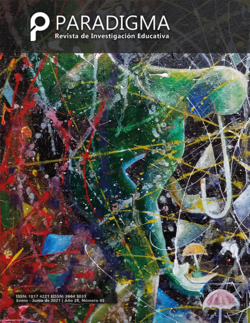Early Literacy Teaching Strategies in Six Multigrade Schools in Honduras: A Cases Study
DOI:
https://doi.org/10.5377/paradigma.v28i45.11736Keywords:
multi-grade schools, meaningful learning, Communicative Approach, early literacy strategies, teacher’s role, student’s roleAbstract
To know the pedagogical practices implemented in five multi-grade schools that surpassed the national median on the external performance test in 2016, a qualitative, descriptive cases study was conducted. To collect the data interviews, class observations, and lesson plan analyses were executed. The study reports that teachers employed strategies that were adapted to the multi-grade classroom, having as a framework daily planning of lessons, permanent teacher training, and the use of resources and materials provided by the Secretariat of Education. Since strategies used by teachers are not generally designed for the multi-grade setting, it can be implied that their use is a significant factor that played an important role in the results obtained on the end of the year performance test. Furthermore, teacher commitment to receive training and their use of the official materials can also be considered relevant factors in the performance achieved by the students.
Downloads
1618
Downloads
Published
How to Cite
Issue
Section
License
Transfer of Copyright
- The author, when sending the work, states that it is his will to give the Universidad Pedagógica Nacional Francisco Morazán the patrimonial rights that correspond to him as the author of his work.
- The rights here assigned include all economic rights (Reproduction, transformation, public communication and distribution) and are given without limitation in terms of territory; This Assignment is given for the entire duration term established in the current legislation in Honduras.
- The cession of the aforementioned rights does not imply the cession of moral rights over it, because in accordance with the provisions of the Copyright and Related Rights Law, Chapter II, of the Moral Rights, Article 34, Article 25 , these rights are inalienable, imprescriptible, indefeasible and inalienable.
- The research work or document must be original and have been done without violating or usurping rights of third parties, therefore, the work is exclusively authored and owns the same.
- In the case of any claim or action by a third party, as to copyright on the work in question, the author must assume full responsibility for the rights assigned.
- Upon completion of the Rights Assignment Form, the author states that the work has not been published in another way, that the rights on the work have not been assigned and that no encumbrance or limitation on their use or use is imposed on them.





